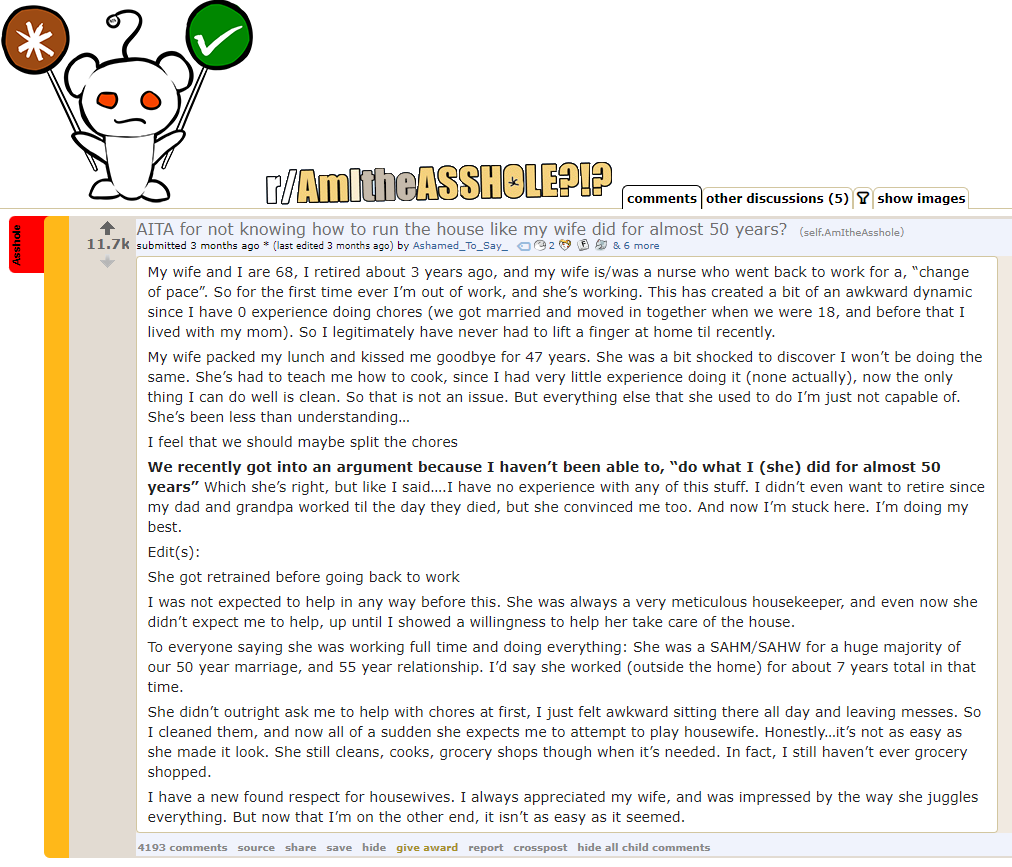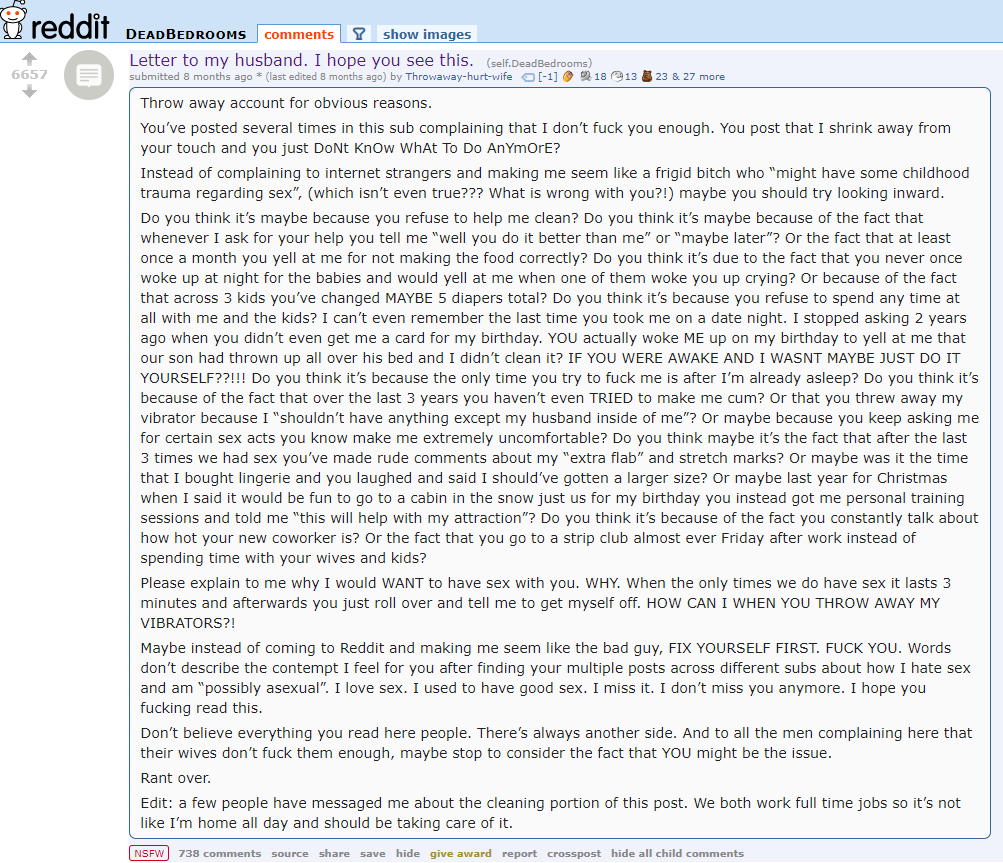Hey there! Here for a brief blurb on a frustrating slice of life I know many folks have experienced, myself included.
A reality of existing in partnered relationships or even just cohabiting situations is that division of labor is going to happen, it’s not always going to be intuitive, and it quite often is a source of frustration, discontent, and disagreement between the two (or more!) parties involved.
Sometimes, it goes further than that, and difficulty in managing chores or having a shared vision for the household becomes a front-and-center problem in a relationship. This is what I will be writing about today, and will touch on the concepts of weaponized incompetence and emotional labor, among other things. I want to acknowledge that these problems can exist in any relationship, from a college roommates situation to a workplace to a “they often come over my house for dinner situation” to a marriage, and more. Most often, this topic is discussed in the context of straight-passing relationships between men and women, and so while I’m going to check myself on my gendered language and stereotypes, the sources I might reference might not, so just know this can apply across the board to whatever living situations and genders might be involved.
Anyways.
Jared Sandberg first coined the term “Weaponized Incompetence” way back in 2007 in this article, stating this “ritualistic charade…isn’t about having a strategy that fails, but a failure that succeeds.”
Basically, there is a manipulative tactic wherein one can possibly escape doing work by feigning ignorance to how to complete the work, or by doing the work so poorly that they don’t get beleaguered by being asked to do it again.
I heard this advice early on in my dating life from some middle-aged woman I worked with at a grocery store. “Don’t ever tell a man you can cook,” she’d said when I had expressed an interest in cooking — we worked at a grocery store, for goodness’ sake, but I digress — “Because then he’ll expect you to cook every time. Every meal. When you cook for him the first time, you make sure you burn the everloving shit out of that meal.” So here we have it, folks — advice I got at age 16, and fortunately (both for me, my peers, and for my budget) I have so far — willingly — never destroyed a meal to manipulate a person into buying me dinner instead. While this advice likely made sense given her life story, (hell, I don’t know,) it is in line with a manipulation tactic to take work off of one’s plate and place it squarely on another’s, all the while feigning ignorance.

Now, if you’re actually a bad cook rather than playing a role of one, I’m not saying it’s a problem. The trouble with the above is that it is disingenuous, manipulative, and just kinda “bleh.” It outsources the bulk of work onto other persons. And it can be translated out into a myriad of household stuff: Knowingly not putting the dishes back in the right spot, “forgetting” how to load the dishwasher correctly, intentionally folding and storing stuff wrong, Purposefully missing trash days, “forgetting” that the sound from my xbox travels through your wall at 2am, missing your birthday because “I’m bad at dates,” you get the picture I hope. Much like the trope of a work boomer refusing to learn how to open a PDF despite the technology having existed since the late 1990s, this stuff can sometimes be ubiquitous, though that doesn’t necessarily make it feel any less frustrating.
If any of this sounds familiar, you may have experienced this before–
“I suck at this stuff; you’re so much better at this than me.”
“I can never get it right, but you always do.”
“You’re never happy with the way I do things.”
“If you tell me what to do, I’ll do it.”
Now, I’m also not saying that all weaponized incompetence is a genius masterplan crafted by a master manipulator. Sometimes, it’s more in line with learned helplessness, where a person can’t figure out how to do a task and won’t learn how. Whether it’s due to a preference for ignorance, plain laziness, or because there’s some other speedbumps in the way, it makes for a tough situation.
Let’s review some speedbumps because it is important to have empathy for them:
- History of trauma or abuse, or just a plain ol’ stressful living situation: Say a person grew up in a household where they were not allowed to participate in household chores, were treated as “never good enough,” were harshly criticized for failures, were held to perfectionistic standards, or had some trauma surrounding certain household things or chores — it makes sense then that these would present a tough psychological burden to someone who had experienced this.
- Depressive symptoms: Having no energy, motivation, or will to do things is a tough depressive symptom that some folks manage.
- Executive dysfunction: A hallmark of neurodevelopmental disorders like ADHD, autism, and others, sometimes remembering, prioritizing, and completing tasks is harder. Also present in this are sensory issues, which might make vacuuming, or doing auto maintenance work, for example, feel pretty damn hard to accomplish.
I want to acknowledge that there can be very real reasons for folks not being able to accomplish tasks around the home or workplace. These can be managed with the help of peers, a therapist, psychiatrist, and through medical or behavioral means. Furthermore, it’s only human to stink at some things and sometimes get down on yourself or need help from others. Not to belabor the point, but to refer to weaponized incompetence is not to include these folks and situations, and so while I’d like to offer my empathy and understanding for these occurrences, I’ll continue to discuss what to do when the incongruence or incompetence is a pattern and a choice rather than a symptom.
So, back to the above statements. Despite how innocuous these statements may seem, there is a flip side to this for the person on the receiving end of those remarks:
“I suck at this stuff; you’re so much better at this than me.” -> It is frustrating to hear this “compliment” and then observe a partner proceed to make no efforts to get better. Generally with things like cooking, for example, it takes practice to improve on skills and knowledge; nobody makes a grandma-level lasagna right off the bat. Somebody has to learn how to use excel skills somewhere before jumping into pivot tables. What I’m saying is, we are also always learning, and learning to do things is more accessible than ever (YouTube tutorials, endless articles, lifehacks crap, online courses, etc.). While it is true that some things come easier to others, neglecting to do the work to better oneself because there is a presumption that the labor can be outsourced to another, unwittingly, is a troublesome paradigm.
“I can never get it right, but you always do.” -> This puts the onus on the recipient of the remark to do the task because it’s perceived as an “effortless accomplishment” for them. The assumption that doing these tasks is effortless for the other person can be damaging when in actuality tasks take time and effort.
“You’re never happy with the way I do things.” -> This puts the responsibility on a partner to “lower their standards” or else do it 100% of the time. A word on this — I know everyone is allowed different standards for living. I am not saying this applies in all living and cleaning/organizing situations. But much like (and very much unlike) the infamous description for obscenity, you know it when you see it. If this (this here being an inability to set an agreeable standard across the board and a person continually failing to meet such a reasonable standard) feels like it is happening ad nauseum and negatively impacting a relationship, it’s likely there is an impasse there presenting a problem. Again, people are allowed to have different standards or household rules, and hell, people are allowed to take up the mantle of responsibility if they choose to do so to uphold their chosen standard (for example: I have a certain way I like the pillows on my armchair to be organized, so rather than expect anyone else to memorize it when I have company over, I just organize it the way I like every time I clean up following) but if this feels unfair and like it’s happening all the time or adds an undue stress to the relationship, it is worth examining and reconsidering.
Add to that that it’s often that women in heterosexual relationships and marriages bear the brunt of housework, as discussed in this article, which found that men “create” an extra 7 hours of chores for women during the week:
Researchers at the University of Michigan analysed data from time diaries, concluding that that the average married woman does seven more hours of housework per week than the average single woman.
The average married man only does one more hour of housework per week compared to his single counterparts.
[…]
Researchers also found that having children increased the amount of housework done by women, but seemed to reduce the amount done by men.
Married women with more than three children did an average of 28 hours per week, more than 10 hours more than the average woman.
In contrast, married men with more than three children did around 10 hours of housework per week, compared to 13 hours completed by the average man.
There’s a trope joke of useless boomer dads and incompetent husbands that is “hilarious,” right? I know you’ve seen it. People fawning and posting and being like, “haha he doesn’t know how to make the bed it’s so cute” or “I left on a business trip and came home to ten thousand mountain dews in the living room haha” or whatever and it’s all fun and games, right? But it seems problematic to be dealing with this on the other end, and furthermore, I’m sure that’s not how men want to be represented as incapable beings, right??

Now, I understand that many folks who say these things don’t necessarily have mastermind intentions, again, of trying to get another person to do it all. But sometimes, this is the case. Sometimes, it’s built atop a scaffold of laziness or a “can’t be bothered” attitude. In reality, what this comes across as can ultimately be a lack of care in the relationship.
A viral article, “She Divorced Me Because I Left Dishes By The Sink,” digs into this phenomenon more. It was written by a man whose relationship with his wife ultimately ended for something as minute as having left the dishes by the sink. Wild, right? What a minor occurrence, right?
As the author put it,
“The wife doesn’t want to divorce her husband because he leaves used drinking glasses by the sink.
She wants to divorce him because she feels like he doesn’t respect or appreciate her, which suggests he doesn’t love her, and she can’t count on him to be her lifelong partner. She can’t trust him. She can’t be safe with him. Thus, she must leave and find a new situation in which she can feel content and secure.
…
In theory, the man wants to fight this fight, because he thinks he’s right (and I tend to agree with him): The dirty glass is not more important than marital peace.
If his wife thought and felt like him, he’d be right to defend himself. Unfortunately, most guys don’t know that she’s NOT fighting about the glass. She’s fighting for acknowledgment, respect, validation, and his love.”
I think this is the underneath of the underneath of this phenomenon and why it hits home for so many folks: continually being unable to agree on tasks and complete them in tandem leads to relational stress, and ultimately, potentially a breakup. The man referenced in the article above is an adult and understood how to put dishes in the dishwasher, or give them a quick rinse, rather than leave them by the sink for his partner to find. He also was made aware that this was an important issue for her. Instead, he chose to not acknowledge how important it was to his partner, causing a divide that their relationship ultimately couldn’t survive.
That seems to be one of the major problems with weaponized incompetence: it puts stress on the relationships it touches. The roommate that uses your frying pan and forgets not to scratch the nonstick coating has just done damage to the relationship in addition to the kitchen implement. The housemate who consistently clogs up the sink with dishes burdens peers who need to use the kitchen to cook a meal on their time. The partner who refuses to clean the shower hair out of the drain leaves something for someone else to find and have feelings about. The manager who doesn’t change their comic sans 16pt bright pink font burns the eyes of everyone the email touches, and people react to that stuff. It does matter.

There’s examples of this across the board, with another referenced above. A man posted asking for feedback on “how” to complete the chores that his stay-at-home wife had always accomplished over the course of their marriage now that he retired and she went back to work.
Resoundingly, the poster received the feedback that he was intentionally and willfully being incompetent, with most commenters agreeing that he could, in fact, learn how to pack a lunch and do chores around his own home.
Despite the myriad of options to do so, I promise you that even the most boomerest of dads can in fact learn to pack his own lunch.
Now, I’m going to talk about a bit more insidious comment that a person weaponizing incompetence might say, from the above remarks.
You’ve probably heard someone before be like, “Yeah, see, I don’t really notice when the sink gets full of dishes. So, just tell me when it gets to be too much.” Or something like, “I do do chores! Just tell me what you want done and I gotchu.”
While it sounds good on the surface (“Yeah, they want to help out, and they’re offering, right?”), there’s some hidden problems with this message.
“If you tell me what to do, I’ll do it.” -> When a person says this, it then becomes the other partner’s responsibility to assign tasks and manage chores in a relationship. This also shoulders one partner with the emotional labor of managing and delegating household chores.
What’s emotional labor?
I have two good resources to share on this that might be helpful in decoding it. Firstly is “You Should’ve Asked,” a comic by a woman about what mental load is. There’s also a resource by a man in his Robert the Otter comic strip, entitled, “Do Men Expect Women to do Everything?”
Basically, emotional labor is akin to a mental load in that it’s work that folks have to have on their mind or keep in working memory. Things like remembering birthdays, remembering the trash day, remembering to take care of the kitchen sink, remembering when a report is due, remembering soccer practice, remembering to pay bills, remembering which tasks to do when, and delegating said things. In our culture, the bulk of shouldering a mental load or doing emotional labor often falls on folks socialized as female, or women.
Now, it might be relevant for me to note, the roles that we are prescribed to fall into are a cultural creation. Women are not biologically more adept at remembering birthdays, or emptying a dishwasher than men. Socially, women are expected to do household chores and tasks. And men?
I was scrolling through tinder the other day, and saw this profile — it was a cis dude, and his bio said “I want to be in a relationship that’s a give and take. I know both people have to agree to do the chores they’re comfortable with, like one person is better at the laundry and the other person is better at the cooking. I don’t like to do the laundry but I will fix your car.”
At first glance, it sounds like wow, this guy is emotionally intelligent right? And he’s not going to just lay the chores on someone else, he understands that they need to be split up. But then I thought about it more — the stereotypical “the women do the chores inside the house, the men do the car and yard stuff” is also troublesome and potentially inequitable — one partner is left with dishes and cooking everyday, and cleaning, tidying, weekly laundry, and the other fixes a car once or twice a year? How is that fair?
Obviously, folks can agree to and negotiate whichever chore breakdowns they want in a household or a workplace — and that’s fine. Some people find the above arrangement wonderful, and if they’re happy with it, cool. The problem lies in society prescribing what things should and shouldn’t look like, and then people presuming that that just should be ok for all parties involved without discussion. So that tinder guy was partway there — his intentions were good, and he was clear at communicating his strengths and weaknesses as well as his preferences, so we’ll see what happens. Well, I won’t; I swiped left.
OK, back to emotional labor and weaponized incompetence. What’s the fallout of all the above happening?
For starters, having one person in a partnership, or one person in a house full of roommates, or one competent person at a workplace shouldering all of the workload is a horrible time. The “responsible” partner has to not only notice when things are going on and devise a solution, they also have to delegate it. This creates a power imbalance in relationships that can become unhealthy. I’ll continue to use a romantic relationship as an example here.
The “responsible” partner has to be hypervigilant, and this burden rests on their shoulders. They have to know the family’s schedule, know their shared responsibilities, and pay attention to all that’s going on the household because it’s on them if something slips up. Sure, it’s wonderful to have a partner that will empty the dishwasher when I ask them to, but it would be nicer to have a partner who would just, like, notice and do it themselves. It would remove the burden of remembering when the dishwasher was done and opening it and going “ugh” and then yelling up the stairs, “Hey, can you empty the dishwasher??” It would also remove the icky feeling of having to be in a position of power over an intimate partner.
Often, this kind of delegating that comes about from weaponized incompetence causes the “responsible” partner to feel burned out, annoyed, exhausted, and overwhelmed. AND it can bleed into the relationship, making them feel resentful, frustrated, avoidant, and turned off by their partner. Being in a “mom” role over a partner often is not a turn-on. Over time, this can put a wedge between partners and lead to division, a breakdown in communication, loss of sexual interest or intimacy, decreased connection, you name it. That’s a pretty dire consequence for weaponized incompetence.

Case in point above: the top post of a subreddit dedicated to folks feeling a lack of sex in their relationship (not a sub I recommend you look at, mind you) illustrates this exact point. It is often hard to feel appreciated, loved, respected by a partner, or feel attracted to them, when you find yourself in a managerial role over them. Weaponized incompetence has real consequences: for the partners who choose to leave, as aforementioned, and for partners who continue to struggle in relationships and find themselves hurt, resentful, and losing feelings for someone they hoped would be a partner.
And cool, how about that communication? It’s overdone in therapy, and rightfully so, “You need to communicate more!” “Communicating about things will fix it!”
The trouble with this is, you guessed it, more gender role bullshit. Unfortunately, for problems like this, communication can sometimes only go so far. It’s often the case that the “responsible” partner will communicate ad nauseum to their willfully incompetent partner, and it will fall on deaf ears, or something will change for a little while and then revert back. The responsible partner can continue to communicate and communicate and delegate and all that but that continues to fall under their purview as emotional labor, which again, is stressful. Unfortunately it often falls on women disproportionately in relationships to “jUsT cOmMuNiCaTe” and there also needs to be a step B where concerns are heard, recognized, affirmed, and managed. And for folks who say, “I will empty the dishwasher, just tell me when you want it done,” they might feel that they’ve then adequately solved the problem, but that is not often the case without additional work and follow-through on their part to remove the additional burden of emotional labor from their partner.

Unfortunately for the “responsible” partner, expressing and communicating needs and then having them continue to remain unfulfilled often leads to feelings of resentment and hurt. Hearing a partner’s needs and then working to remember them and accommodate them can be a sign of respect and love in a relationship, as the partner who has been delegated to can then work on turning toward their partner and expressing that they do find their partner’s needs and comfort to be important to them. To agree and then continue the status quo can communicate the opposite.
Look, I know I’m speaking pretty broadly here. The reality is, this happens in so many relationships in our lives; I know you’ve likely experienced it from both sides, regardless of the environment or genders of the players involved. And it is frustrating! And I’m not making some grand point that every single need a person has, that one should jump up and accommodate it immediately, or keep a running checklist of household chores, or be Superman or whatever. My tl;dr here is, weaponized incompetence sucks. And be an adult and recognize you are capable and can often do things if some effort is applied. Respect the people you live with, work with, date, eat near, whatever.
There’s a difference between equity and equality. Not everything in a relationship has to be 50/50, but folks do need to express what feels equitable and fair, and come to some sort of agreement. And if it doesn’t feel great, to be able to express those needs and have them be heard and acknowledged and attended to in a reasonable fashion.
So what do we do with weaponized incompetence?
Recognize that doing your part is a sign of respect. Have empathy for others around you that you impact with your actions, to a degree. Understand and anticipate the needs of others as well as yourself. If you know it’s bingo night for your roommate, maybe make an effort to clear your scrapbooking stuff off of the communal couch. If you spill wine on someone’s prized sand dollar, maybe offer to make restitution rather than pretending it didn’t happen. If your partner tells you they’re exhausted because whenever they come home from work they have to clean up after your lunch dishes before cooking dinner, maybe make an effort to get those done and appreciate their efforts in cooking for you. To communicate about needs and household desires, and then remembering and acknowledging them, creates a shared vision for management of household and labor that can, just, work.

If there’s truly a “I don’t know how to do this” thing, like if my partner is banger at cooking and I feel like a measly toad because I’m terrified of even boiling water, know that these chores can be done together. I can watch and learn and that can be a bonding moment for us. I can also look up stuff on YouTube and watch someone’s Nana cook something and learn from that. I can find interesting ingredients and suggest fun things. I can ask for encouragement from my partner as I make feeble attempts to not burn the house down in a quest for sustenance. And wouldn’t it feel fucking amazing to learn stuff, make delicious food, feel like I’m Chef Boyardee, and receive the undying admiration and love from the person I come home to???
Listen, I’ve been here on both sides of the coin. I’ve had grown adults I tried to date (keyword tried) pretend that they didn’t know how to fold laundry, and I’ve also feigned ignorance on taking out the trash so I didn’t have to go out into the rain. That’s right, ya girl here has weaponized incompetence before. And you know what changed that for me? Choosing to take pride in my living situation and my relationship. Knowing I was doing something not only for my betterment but also for a loved one made doing annoying chores a wonderful dopamine boost for me when I reframed it that way. Another thing that helped was living alone — it forced me to come to terms with being a sole provider and doing annoying chores that I could have previously gotten out of, if I played my cards right. The result is that I now don’t detest certain chores like I used to, do them all regularly, and feel proud about them. I feel extra proud about taking care of myself and my home when I get to share it with someone else.
Just a little update for you here in the fair year of 2023 —
Check out Eve Rodsky’s Fair Play book and card deck, which is a resource for couples looking to discuss division of labor in the home.
2 Replies to “Weaponized Incompetence and Emotional Labor”
Comments are closed.